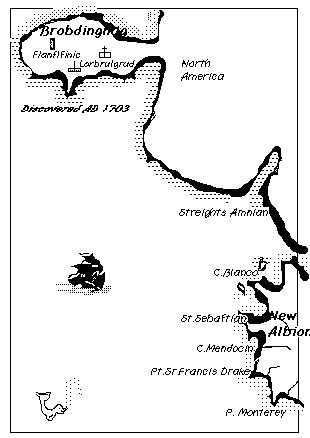 A voyage to Brobdingnag
A voyage to Brobdingnag
SUBJECTS: >attention >creativeness >crisis >curiosity >imagining >forgetting, the importance of >the managerial paradox > The myth of the monohops, >aspects of the creative personality, > creating quality, > ripeness >understanding >work and play >zeal
[back to start Creativity Explored in Gulliver’s Footsteps] [back to Index] [Go to Lilliput start page] Go to Brobdingnag start page]
Short summary
After his arrival home from his voyage to Lilliput, Gulliver stayed but two months with his wife and family. His insatiable desire to see foreign countries and an active and restless life would not suffer him to remain in England longer. Leaving his family well provided for he embarked on the ship called Adventure on the 20th day of June 1702 bound for Surat.
A strong gale drove them to the Cape of Good-hope, where they stayed the winter. In March of the following year, the ship set sail and had a good voyage till they passed the Streights of Madagascar. For 20 days a terrible gale drove the ship hundreds of miles off her course. When land came in sight a party of men, Gulliver at his own request among them, went ashore for water. On the shore Gulliver wandered away from the other men and when he came back he saw his companions furiously rowing away, followed by a gigantic creature. Gulliver then ran back into the country.
There he ended up in cornfield hiding from these giants. The corn was at least forty foot and became too thick for him to go through. When one of the workers harvesting the corn came near him he shouted and luckily his screams are heard. He was then picked up like an insect and carried to the farmer, a man as tall as a steeple. When the giants see his extremely polite behaviour and manners, and after a thorough investigation he is put on the table as a curiosity. He is then entrusted into the care of the daughter Glumdalclitch, a nine-year-old girl, forty feet tall. She was very kind to Gulliver and made his clothes. 'To her I chiefly owe my preservation to that country: we never parted while I was there; ....' She also taught him their language. However, in spite of all her good care could not prevent him from being in continual danger. Once he was attacked by a pair of rats the size of dogs, one of which he killed with his dagger. At another time he is attacked by wasps which carry off the sweet cake. He killed a number of them and found that their stings were as large as a dagger. Other problems are the clearness with which he sees insects and vermin such as lice. Also the loud voices of these giant are dangerous e.g. the cries of a baby nearly deafened him: ... 'and began a squall that you might have heard from London-Bridge to Chelsea;....'.
A friend of the farmer advised him to show this little creature (Splacknuck) to people for money. The farmer then put Gulliver to good use by showing him to people, where he has to perform, which proved a most profitable business. This he had to do on some days as many as twenty times a day. This together with the hardships of the journeys to the market towns, greatly reduced his health and condition. Reduced to a shadow of his former self, Gulliver was glad to pass into the hands of the queen of Brobdingnag, who bought him as a pet. At the court his life was more comfortable and a special box is made to his directions to serve as his room. Still he has to be on his guard against all kinds of insects, cats and dogs, and is once carried off by a monkey to the roof of the palace. He was then only rescued with great difficulty. He was tormented by the Queen's dwarf who, though but thirty feet high, became aggressive at seeing a creature so much below him. All the same Gulliver came to realize that the Brobdingnagians were as gigantic as they were kind-hearted and generous. They were firmly set against all forms of tyranny and oppression, and their King indignantly rejected Gulliver's proposal to teach him how to make and use gunpowder. When gulliver gave the King a proud account of the state of affairs in England, the latter's reaction was: 'I cannot but conclude the Bulk of your Natives, to be the most pernicious Race of Little odious Vermin that Nature ever suffered to crawl upon the Surface of the Earth.' Two years after his arrival in Brobdingnag Gulliver accompanied the King and Queen on a royal journey to the south coast. He made the journey in a specially constructed travelling-box carried by a page. When the page put down the box on the sea-shore, a great bird picked it up, flew away with it and dropped it into the sea, where Gulliver was rescued by an English ship and taken back to England.